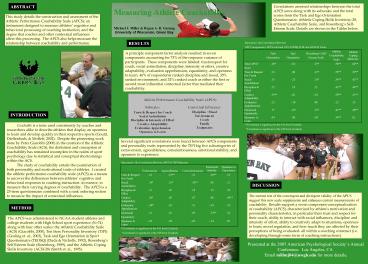Measuring Athlete Coachability - PowerPoint PPT Presentation
1 / 1
Title:
Measuring Athlete Coachability
Description:
Trust & Respect for Coach Social Assimilation Discipline & Intensity of Effort ... Discipline / Mood Environment Coach Family Teammates ... – PowerPoint PPT presentation
Number of Views:440
Avg rating:3.0/5.0
Title: Measuring Athlete Coachability
1
ABSTRACT
Correlations assessed relationships between the
total APCS score along with its subscales and the
total scores from the Task and Ego Orientation
Questionnaire, Athletic Coping Skills
Inventory-28, Athletic Coachability Scale, and
Rosenbergs Self-Esteem Scale. Details are shown
in the Tables below.
Measuring Athlete Coachability
This study details the construction and
assessment of the Athletic Performance
Coachability Scale (APCS) an instrument designed
to measure athletes cognitive and behavioral
processing of coaching instruction, and the
degree that coaches and other contextual
influences affect this processing. The APCS also
helps measure the relationship between
coachability and performance.
Michael J. Miller Regan A. R. Gurung
University of Wisconsin, Green Bay
RESULTS
Spearmans rho Correlations Between
APCS components/ APCS total and ACS, TEOSQ, R-SE
and ACSI-28 Totals
A principle component factor analysis resulted in
seven components accounting for 73 of the
response variance of participants. These
components were labeled trust/respect for coach,
social assimilation, discipline /intensity of
effort, creative adaptability, evaluation
apprehension, equanimity, and openness to learn.
46 of respondents ranked discipline and mood,
35 ranked environment, and 32 ranked coach as
either the first or second most influential
contextual factor that mediated their
coachability.
Athletic Performance Coachability Scale (APCS)
Subscales Contextual
Influences
Discipline / Mood
Environment
Coach Family
Teammates
Trust Respect for Coach
Social Assimilation
Discipline
Intensity of Effort Creative
Adaptability Evaluation
Apprehension Openness
to Learn
INTRODUCTION
Coachable is a term used consistently by coaches
and researchers alike to describe athletes that
display an openness to learn and develop quickly
in their respective sports (Gould, Dieffenbach,
Moffett, 2002). Despite the pioneering work done
by Peter Giacobbi (2000) in the creation of the
Athletic Coachability Scale (ACS), the definition
and conception of coachability has remained
incomplete in the realm of sport psychology due
to statistical and conceptual shortcomings within
the ACS. The study of coachability entails the e
xamination of both personality and motivational
traits of athletes. I created the athletic
performance coachability scale (APCS) as a means
to uncover the differences between athletes
cognitive and behavioral responses to coaching
instruction- in essence, to measure their varying
degrees of coachability. The APCS is a 23-item
questionnaire combined with a rank ordering
section to measure the impact of contextual
influences.
Correlation is significant at the 0.01 level
(2-tailed). Correlation is significant at the
0.05 level (2-tailed).
Several significant correlations were found
between APCS components and personality traits
represented by the TIPI big five subcategories of
extraversion, agreeableness, conscientiousness,
emotional stability, and openness to experience.
Spearmans rho Correlations Between APCS TIPI
Subscales
DISCUSSION
The current test of the convergent and divergent
validity of the APCS suggest this new scale
supplements and enhances current measurements of
coachability. Results support a seven component
conceptualization of coachability (APCS),
characterized by athletes motivation and
personality characteristics, in particular their
trust and respect for their coach, ability to
interact with social influences, discipline and
intensity of effort, ability to creatively adapt
to situations, openness to learn, mood
regulation, and how much they are affected by
their perceptions of being evaluated- all within
a coaching construct (i.e. developing through
some form of coaching instructions).
METHOD
The APCS was administered to NCAA student
athletes and college students with High School
sport experience (N74) along with four other
scales the Athletic Coachability Scale (ACS)
(Giacobbi, 2000), Ten Item Personality Inventory
(TIPI) (Gosling et. al., 2003), Task and Ego
Orientation in Sport Questionnaire (TEOSQ) (Duda
Nicholls, 1992), Rosenbergs Self Esteem Scale
(Rosenberg, 1989), and the Athletic Coping Skills
Inventory (ACSI-28) (Smith et. al., 1995).
Correlation is significant at the 0.01 level
(2-tailed). Correlation is significant at the
0.05 level (2-tailed).
Presented at the 2005 American Psychological
Societys Annual Conference. Los Angeles, CA.
Email millmj04_at_uwgb.edu for more details.































